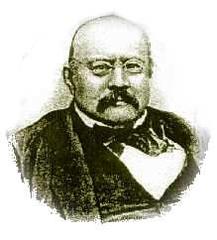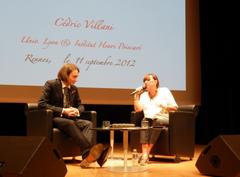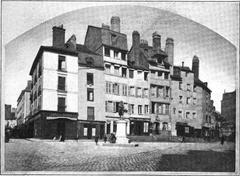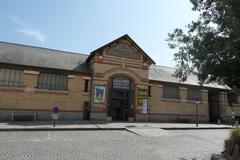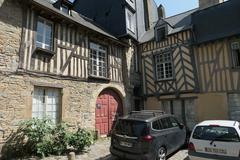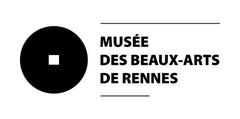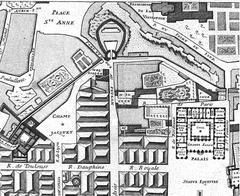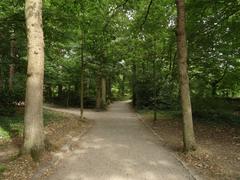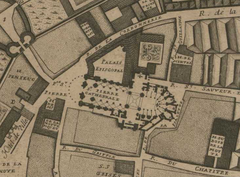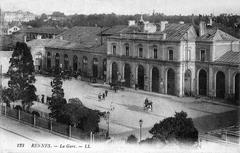Joseph Turmel Rennes Visiting Hours, Tickets, and Historical Significance Guide
Date: 04/07/2025
Introduction: Joseph Turmel’s Legacy in Rennes
In the heart of Brittany, Rennes stands as a beacon of intellectual heritage and cultural vibrancy. Among the luminaries connected to the city is Joseph Turmel (1859–1943), a French Catholic priest, historian, and theologian, celebrated for his critical examination of Christian dogma and his audacious role in the Catholic Modernist movement. Though Turmel’s challenge to ecclesiastical orthodoxy led to excommunication, his influence endures—symbolized by Rue Joseph Turmel, a residential street in Rennes that pays homage to his intellectual courage.
Rennes’ blend of historical architecture, academic tradition, and dynamic cultural life provides an ideal environment for exploring Turmel’s legacy. Visitors can trace his footsteps, discover key sites integral to his story, and immerse themselves in the rich tapestry of the city’s religious, secular, and academic history. For practical information, the Official Rennes Tourism Website offers comprehensive resources, including maps and guided tour schedules. Insightful background on Turmel himself is available at Mythicist Papers and Wiki-Rennes Rue Joseph Turmel.
Guide Contents
- Introduction: Joseph Turmel and Rennes’ Cultural Heritage
- Turmel’s Biography: Early Life, Academic Formation, and Ecclesiastical Roles
- Turmel’s Critical Scholarship and Modernist Conflict
- Visiting Rue Joseph Turmel: Significance and Practical Information
- Key Related Sites in Rennes
- Grand Séminaire de Rennes
- Little Sisters of the Poor Convent
- Rennes Cathedral
- Parliament of Brittany
- Other Notable Landmarks
- Visiting Joseph Turmel’s Grave at Cimetière du Nord
- Practical Visitor Information (Hours, Accessibility, Tickets)
- Travel Tips and Nearby Attractions
- Visual and Interactive Resources
- Respectful Engagement and Ethical Guidelines
- Commemorative Associations and Events
- Frequently Asked Questions (FAQ)
- Conclusion: Embracing Rennes’ Intellectual Heritage
- Essential Visitor Information and Sources
Joseph Turmel: Historical Background and Enduring Legacy
Joseph Turmel was born into a modest family in Rennes. His early promise led him to the Grand Séminaire de Rennes and the University of Angers, where he studied theology (Mythicist Papers). Ordained in 1882, Turmel became a professor of dogmatic theology at the Seminary of Rennes and later served as chaplain to the Little Sisters of the Poor. His critical approach to doctrine, influenced by contemporary scholarship, eventually led to his private loss of faith by 1886. Unable to express his heterodox views openly, he published under pseudonyms and produced a substantial body of work, including the influential six-volume “History of Dogma.” His conflict with the Church culminated in excommunication in 1930, yet his intellectual legacy continues to inspire debate and inquiry.
Exploring Rue Joseph Turmel: A Symbolic Visit
- Location: Rue Joseph Turmel, 35000 Rennes, France; coordinates 48.121156, -1.654012.
- Access: Easily accessible by foot, bus, or metro from the Rennes city center (Gralon.net).
- Visiting Hours: Open year-round, with no entrance fees.
- Nature of the Site: Rue Joseph Turmel is a residential street named in 1949 to honor Turmel’s intellectual legacy (Wiki-Rennes Rue Joseph Turmel). There are no monuments or museums, but a stroll offers a reflective experience on Rennes’ cultural and academic spirit.
Tip: Respect resident privacy and treat the area with the decorum appropriate to a living neighborhood.
Key Historical Sites Connected to Joseph Turmel in Rennes
Grand Séminaire de Rennes
The former seminary where Turmel studied and taught remains a historical landmark. Access to the interior is limited, but the exterior and surrounding area are freely visitable. For special events or guided tours, consult the Official Rennes Tourism Website.
Little Sisters of the Poor Rennes Convent
Turmel served as chaplain here in the 1890s. Although not generally open for tours, visitors can appreciate the convent’s role in Rennes’ religious history from the exterior.
Rennes Cathedral (Cathédrale Saint-Pierre de Rennes)
This historic cathedral offers insight into the spiritual environment that shaped Turmel’s early years. It is open daily with free entry (Official Rennes Tourism).
Parliament of Brittany (Parlement de Bretagne)
A symbol of civic debate and the city’s intellectual tradition, the Parliament is open for tours from 10 AM–6 PM daily.
Other Landmarks
Include Place Sainte-Anne (for cultural immersion), the Museum of Fine Arts, Hôtel de Ville, Portes Mordelaises, and local museums such as Les Champs Libres.
Visiting Joseph Turmel’s Grave at Cimetière du Nord
- Location: Cimetière du Nord, Rennes.
- Visiting Hours: Typically open 8:00 AM–6:00 PM; check for seasonal variations.
- Tickets: Entry is free.
- Description: Turmel’s grave features a granite menhir with an inscribed medallion, marking his contribution as “Prêtre. Historien des dogmes.”
- Conduct: Maintain respectful silence; avoid leaving religious symbols inconsistent with Turmel’s secular legacy.
Practical Visitor Information
- Guided Tours: Historical walking tours of Rennes often include stops at major religious and academic sites. Check with the Rennes Tourist Office for schedules.
- Accessibility: Rennes is walkable and well-served by accessible public transport. Some older sites may have uneven surfaces.
- Accommodation: Lodging options range from boutique hotels in the historic center to budget-friendly hostels (Hikersbay).
- Dining: Enjoy Breton cuisine at local creperies and visit the Lices Market for regional products.
- Nearby Attractions: Combine Turmel-related visits with other city highlights such as Thabor Gardens, Place des Lices, and the Parliament of Brittany.
Visual and Interactive Resources
Enhance your experience with digital tools:
- Official Rennes Tourism Website: Interactive maps and high-quality images.
- Audiala App: Curated audio guides and walking tours.
- Cultural Platforms: Virtual tours and online exhibitions of Rennes’ landmarks.
Ethical and Cultural Considerations
Turmel’s legacy is complex, reflecting debates over faith, secularism, and intellectual freedom. Visitors are encouraged to approach sites with openness and respect for residents and differing perspectives. Avoid intrusive photography in residential areas and maintain decorum, especially at gravesites and religious buildings.
Commemorative Associations and Events
While specific associations dedicated to Turmel are no longer active, secular and rationalist events occasionally take place in Rennes. Monitor local listings and the Rennes Tourist Office for lectures and cultural programming that resonate with Turmel’s intellectual spirit.
Frequently Asked Questions (FAQ)
Q: What are the visiting hours for Rue Joseph Turmel?
A: As a public street, Rue Joseph Turmel is accessible at all times.
Q: Is there a museum dedicated to Joseph Turmel?
A: No, but his works and related documents are preserved at the Rennes municipal library and the Bibliothèque nationale de France in Paris.
Q: Are guided tours available that feature Turmel’s legacy?
A: While there are no Turmel-specific tours, many Rennes historical tours include relevant sites. Inquire at the Rennes Tourist Office.
Q: How can I get to Rue Joseph Turmel?
A: The street is accessible by public transport and on foot from the city center.
Q: Is Rennes accessible for visitors with mobility challenges?
A: Yes, most public areas and transport are wheelchair accessible, but check site-specific details in advance.
Conclusion: Embrace Rennes’ Intellectual Heritage
Joseph Turmel’s journey—from a devout priest in Rennes to a pioneering critic of Christian dogma—mirrors the city’s own vibrant dialogue between tradition and modernity. A visit to Rue Joseph Turmel and related sites offers a unique perspective on Rennes’ rich intellectual history. Engage respectfully with these places, make use of digital resources like the Audiala app, and explore the full cultural breadth of the city. Rennes invites you not only to discover its past but to participate in its ongoing conversation between faith, reason, and free inquiry.
Essential Visitor Information
- Language: French (English is widely understood in tourist areas)
- Currency: Euro (€)
- Safety: Rennes is generally safe and welcoming
- Official Tourism Website: Tourisme Rennes
Sources and Further Reading
- Exploring Rue Joseph Turmel in Rennes: History, Visitor Info, and Nearby Attractions, 2025, Rennes Tourism (https://www.tourisme-rennes.com)
- Visiting Joseph Turmel’s Rennes: Historical Sites, Legacy, and Travel Tips, 2025, Mythicist Papers (https://www.mythicistpapers.com/2012/10/01/joseph-turmel/)
- Exploring Rue Joseph Turmel and Historical Sites in Rennes: Visitor Guide and Tips, 2025, Gralon.net (https://www.gralon.net/plan-ville/planr-rue-joseph-turmel-rennes-21004.htm)
- Joseph Turmel and Rennes Historical Sites: Visiting Guide, Hours, and Cultural Insights, 2025, Wiki-Rennes Rue Joseph Turmel (https://www.wiki-rennes.fr/Rue_Joseph_Turmel)
